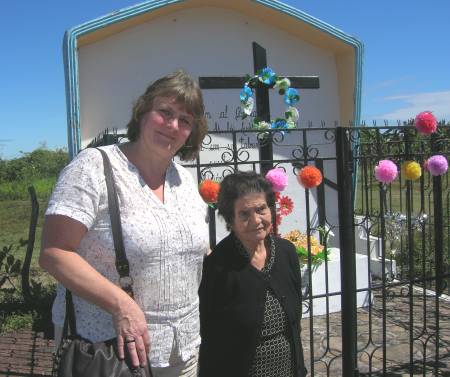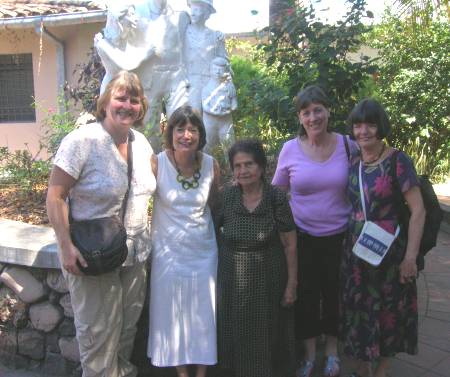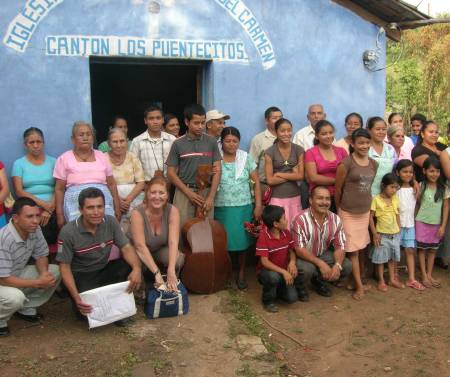In November 2010, a group of people from CAFOD and the Romero Trust made a Pilgrimage to El Salvador to mark the 30th Anniversary of the deaths of the missionaries in El Salvador on 4th December 1980. They were: Ita Ford; Maura Clark; Dorothy Kazel and Jean Donovan.
Margaret Siberry, CAFOD Diocesan Manager for Leeds, shares her reflection of the Pilgrimage.

Rosa, standing tall, reached only to my shoulder. Aged 80, she had travelled alone the long journey by bus from Jayaque to San Salvador. She makes the same journey every year to take part in the annual vigil marking the martyrdom on 16th November 1989 of the six Jesuit priests, their housekeeper and her daughter. She comes to stand in solidarity, to give thanks for the support offered by the Jesuits to her community during the civil war and with resettlement after. Her 21st year of witnessing to truth, peace, and justice for the poor of El Salvador – our first – as we walked and prayed with the pilgrims, listening to their stories and marvelling at the number of young people whose commitment seemed just as strong as Rosa’s. The vigil was not nostalgia about the past but a re-membering in its deepest sense, ‘putting back together the body’ – naming the truth that heals as well as proclaiming today’s reality – in order that all ‘may have life, life in all its fullness’ (Jn 10:10).

We had come as pilgrims, not tourists, to this Land of Martyrs. We were there, each of us called in a unique way by the witness of Archbishop Romero, to listen, to learn, to share our stories and to walk for a while with the people of El Salvador. We came to a country still polarised economically between powerful and powerless, a country where the poorest fifth have 2.67% share of overall income and where almost a third of the country’s revenue comes from remittances sent by emigrants to the States. We learned of the violence, the growing gang culture, the need for the truth of the civil war atrocities to be told so that the healing of individuals and the nation can happen.
We were heartened when our partners from Tutela Legal, a human rights organisation based in San Salvador, told us about their work in parishes, schools and local communities helping people ‘to influence the systems, decisions and resources affecting them’, supporting them to strive for ‘governments, institutions and global structures that are just and accountable’.
We were inspired by the Jesuits at the UCA (the University of Central America) whose education, theology, social outreach and human rights programmes are at the service of building a just civil society where ‘women and men in the poorest communities have access to the essential services they need to live sustainably and with dignity’.
Travelling to visit the Connect2 community of Puentecitos, we were struck by the beauty of the steep hillsides, with the volcano Izalco in the distance – striking countryside but extremely hard work farming small plots on very steep hillsides. Gerardo, Director of our partner, the Jesuit Development Service (JDS), gave us some of the background as we travelled, which made us see even more clearly why our programme there is so vital. After the civil war had ended, campesino farmers were strongly encouraged to buy ‘superior’ seeds that they didn’t realise were in fact genetically modified ‘terminator’ seeds. Many poor farmers had loans to buy these and are now in debt. As well as this, growing mainly beans or rice meant they lost the capacity to grow diverse vegetable and fruit crops.

Now, with support and training from JDS, the sustainable, organic farming programme is helping poor farmers to grow a range of nutritious fruit and vegetables that can then be marketed co-operatively. They are able to save seeds for next year’s planting and thereby become more self sustaining. Rosa Idalia showed us round her small plot, plucking oranges to give to us as she went. She explained how she has learned the principles of permaculture and that she has a small fish tank to farm fish for protein. She is now growing a variety of vegetables that not only feed her family but that she can sell to generate a small income. More than all of this, she was most proud of the fact that she had been trained to run workshops to encourage other communities to learn these skills and transform their lives. Enabling others to change their lives gave her the greatest sense of worth and achievement.
Visiting the community, receiving their overwhelming hospitality and witnessing the hard work and struggle that they still face (especially after learning that the unusually heavy rain had washed away most of the crop of beans – a staple) made us realise how privileged we are to be able to journey with and learn from the villagers. A highlight for the villagers was when we were able to share news from parishes in the UK and exchange photographs, Christmas cards and symbols of friendship. Afterwards, as we stood outside the tiny church, which also serves as a community centre, ‘Puentecitos-Little Bridges’ seemed in its very name to signify sharing solidarity and hope across the miles. A CAFOD colleague standing next to me said ‘It’s these people themselves who are the ‘little bridges’ of hope.’ And we all agreed!
Since returning home it has struck me how CAFOD’s long relationship with Central and Latin America, exemplified in El Salvador, has been instrumental in forming who we are and in helping us articulate and appreciate the vision, mission and values that inspire our work, a vision that has inspired and continues to inspire parishioners throughout the UK. For me, this was an important journey of re-membering, connecting again with a well-spring of faith and hope that is at the very heart of CAFOD’s mission.
